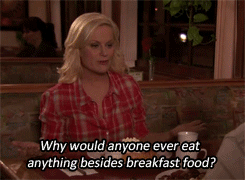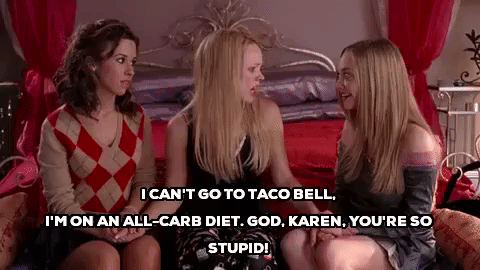News
Bridie Pearson-Jones
May 13, 2017

Picture:
iStock / udra
Weight loss is hard work. No one likes to restrict themselves, most people enjoy chocolate and carbs, but these are things people often cut out when trying to shred the pounds.
The majority of diets require you to cut calories because they want you to see quick results. In reality, this isn't great biologically. Your body actually starts to think it’s actually starving, which makes you more hungry and causes stress eating.
Turns out, a lot of popular diets aren't actually all that good for you, and could cause weight gain.
1. Gluten free
Gluten free diets are trendy. They've been touted as a popular way to lose weight - despite the fact lots of nutritionists saying there's nothing wrong with eating gluten.
However, a recent study from Spain warns that exchanging foods containing gluten with a gluten-free alternative can increase risk of obesity.
This is because many of these gluten-free products actually contain high levels of fat. In the study, researchers compared 655 standard food products with 654 gluten-free options and found that on average, gluten-free bread had more than twice the fat of standard loaves, as well as substantially less protein.
2. Skipping meals, particularly breakfast
Skipping meals, particularly breakfast, might seem like an obvious way to lose weight, but in reality it's very very unhealthy.
Statistics gathered over 20 years by the National Weight Control Registry, found that among dieters who lost at least 30 pounds and kept it off for at least a year, 78 percent ate breakfast every day.
Eating breakfast will also boost your brain power as well as banish cravings and help to maintain weight loss, as well as stopping you from over-eating at lunchtime. Your metabolism increases after eating, so by skipping meals your metabolism can slow down and lead to weight gain.
3. Cheat days
A 'cheat day' refers to a concept where people will diet strictly six days a week and then binge on one day, to "reset" their metabolism, but unsurprisingly it's not a good idea. James Collier, Registered Nutritionist & Cofounder of Huel.com, told The Independent.
A full day of cheat eating is excessive and can be an excuse for the dieter to consume copious amounts of junk food.
Often they consume more than they would usually because they have been restricting themselves for the rest of the time, and hunger can be amplified.
4. Yo-yo diets
Yo-yo dieting, or very low-calorie diets don't actually help you get healthier or shred pounds, at least in the long-term.
Research shows that very low-calorie diets might make you lose weight quickly, but due to the lack of lifestyle change, people gain the weight back very quickly once they hit their goal weight.
5. Lots of exercise (particularly of one type)
While exercise is critical, spending hours and hours in the gym might seem like an obvious and healthy way to lose weight, but it can be counter-productive.
Firstly, sticking to one type of exercise stops your body from being challenged and burns fewer calories than optimum, according to Eat This.
Secondly, over-exercising can lead to getting burned out. High intensity training for 20 minutes, 3–5 times per week is an appropriate amount, along with strength training is a better option.
6. Going carb-free
A lot of populist diets encourage cutting out carbs, because it helps to drop water weight and melt away the pounds at first.
Carbs are essential to make our brain and central nervous system work properly, and cutting them out can lead to cravings and overeating.
7. Sticking to salad
Eating nothing but leaves can mean you lose out on essential nutrients.
Furthermore, if you're eating out, often salads are actually the most calorific item on the menu. Famously, there's more calories in a McDonald's salad than a Big Mac.
8. Juicing and drinking smoothies
Juicing is a popular diet where people only drink fresh fruit juice and water, and no real food - which basically leads to you just drinking sugar and vitamins for the duration of the 'cleanse'.
Smoothies, while delicious and nutritional, aren't great for weight loss. Angela Ginn-Meadow, RD, a national spokesperson for the Academy of Nutrition and Dietetics, told Prevention
People aren't very conscious of what they're putting in their smoothies and bowls. They just toss it all in
The problems crop up with the additional calories from too much fruit, peanut butter, and protein powder.
9. Paleo
Paleo or 'the caveman diet' is a popular diet which encourages you to eat lots of fruit, vegetables and lean meats while avoiding dairy, grains and strarches.
However, a recent study from researchers at the University of Melbourne shows thatPaleo could actually make you put on pounds.
For the study, researchers put mice on the Paleo diet, after nine weeks, the mice eating Paleo gained 15 per cent of their body weight and their insulin levels rose. The mice that ate a 'regular diet' didn’t experience the same changes.
More: The reason why you're likely to gain weight with more diets
Top 100
The Conversation (0)















